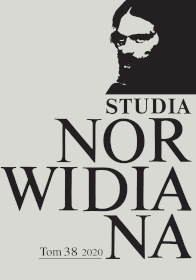Progress and critical thought in Norwid’s and Peter Lavrov’s work
Abstract
The Polish romantic poet Cyprian Norwid and the Russian philosopher and sociologist Piotr Lavrov met while living as exiles in Paris during the seventies of the XIX century. They respected each other, although their worldviews could at first sight not be reconciled (but they were both discontent of the political status quo). Lavrov was an atheist and considered religion to be a „reactionary” force in the age of scientific progress, slowing down the further emancipation of the individual (though previously it performed a positive role). Norwid—on the other hand—thought that progress without roots in Christian sacrality would restrict the idea of humanity and reduce it to a physiological determinism. This article shows the debate between a Polish catholic and an atheist Russian in the context of the period. It focuses on the negative consequences of a narrow scientist attitude (as a matter of fact, rejected by Lavrov), e.g. the relation between contemporary anthropological research and racial theories.
References
Biela M., Czy Norwid współpracował z Hyacinthe de Charencey przy pisaniu „Syna Panny”, „Studia Norwidiana” 27-28: 2009-2010, s. 149-183.
Trojanowiczowa Z., Lijewska E., Kalendarz życia i twórzości Cypriana Norwida, Poznań 2007.
Copyright (c) 2020 Studia Norwidiana

This work is licensed under a Creative Commons Attribution-NonCommercial-NoDerivatives 4.0 International License.





